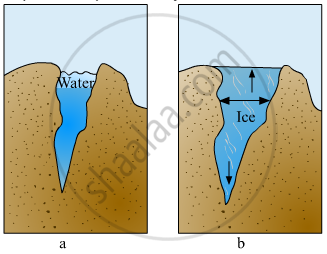Advertisements
Advertisements
प्रश्न
Explain why \[\ce{HCl}\] is a gas and \[\ce{HF}\] is a liquid.
उत्तर
Due to greater electronegativity of \[\ce{F}\] over \[\ce{Cl, F}\] forms stronger \[\ce{H}\] – bonds as compared to \[\ce{Cl}\]. As a result, more energy is needed to break the \[\ce{H}\] – bonds in \[\ce{HF}\] than in \[\ce{HCl}\] and hence the b.p. of \[\ce{HF}\] is higher than that of \[\ce{HCl}\]. Consequently, \[\ce{H - F}\] is liquid while \[\ce{HCl}\] is a gas at room temperature.
APPEARS IN
संबंधित प्रश्न
Describe the usefulness of water in biosphere and biological systems.
Why is it said that-
There is no alternative to water for cleaning purposes.
Explain the picture in your own words.

How will you account for 104.5° bond angle in water?
Write two reactions to explain amphoteric nature of water.
Freezing of water will cause an ______ is the volume.
______ has the highest latent heat of fusion.
Water is circulated around the car engine using the ______ pump and the heat is absorbed.
What are the physical properties of pure water?
The density of gold is 19 g/cm3. If 1.9 × 10−4 g of gold is dispersed in one litre of water to give a sol having spherical gold particles of radius 10 nm, the number of gold particles per mm3 of the sol will be ______ × 106.
